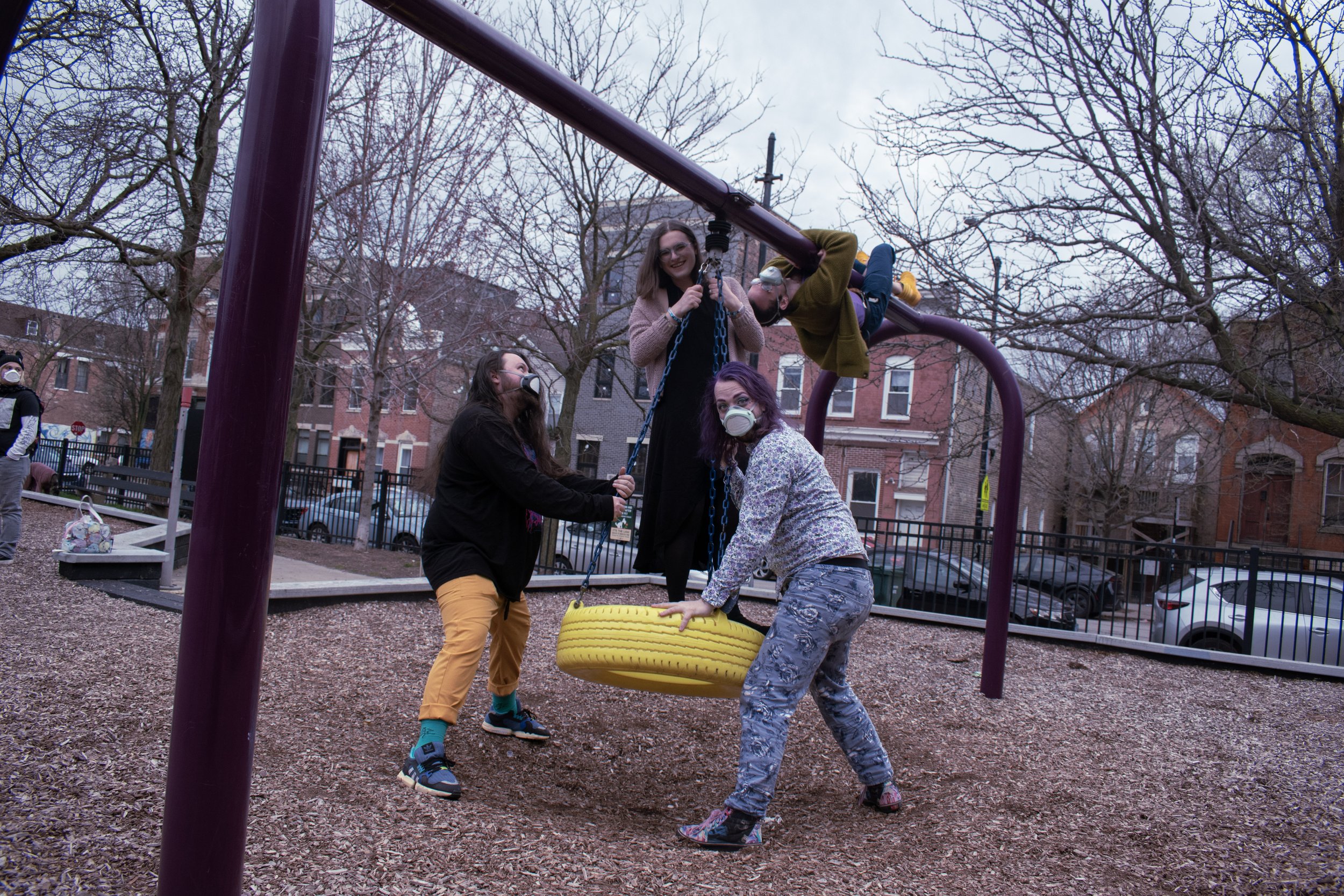The DRIVE Issue: glass beach
WORDS BY ARTHUR MACHADO, PHOTOS BY ELLIOT NOVAK
Online simulacra have defined the new wave of internet music. Small DIY scenes transform in echo chambers. Musicians proudly wear their influences on their sleeves as critics are eager to label them "the next [INSERT POPULAR BAND HERE.]" It feels as if we are being constantly surveilled and constantly judged as our personal CIA agent dwelling behind our webcams acts as the panopticon.
Amid the constant cycle of reinventing the once-popular, Seattle-based quartet glass beach surges from the deep sea with plastic death. Five years after the release of their genre-defining debut, the first glass beach album, I had the privilege of strolling through the picturesque streets of the Pilsen neighborhood in Chicago, as we walked-and-talked about the world glass beach created.
"It feels strange to be here. We're compared to bands like Brave Little Abacus and American Football, who made their stamp in emo music" says William White (they/them), the drummer of the group. "Neither of those bands were successful at their time though. Their greatest impact came way after the fact and it's hard to measure that. I'm already seeing our influence in other bands, which is really wild to see. It's hard to say since it's also invisible and also online," J (she/they), the vocalist and primary songwriter complemented.
Alongside pioneers like Heccra, Weatherday and Home is Where, the group is often credited as one of the heralds of fifth wave emo. The movement that transcends the traditional genre divisions and fully encompasses the online community as its driving force. The movement's lyricism is often tied to internet culture and many of its members identify as queer.
Their first album is deeply rooted in this ethos. Lyrics like "I'm making friends who don't know who I am" in "classic j dies and goes to hell part 1" and "No we'll never leave our bedrooms / We're a bedroom community" in "bedroom community" are akin to scene contemporaries STOMACH BOOK or Hey, Ily. There is this interconnected sense of utilizing the digital world as a form of escapism. On the internet, no one knows you're a dog (or Classic J,) and glass beach's songs become a safe space for those seeking shelter.
"A lot of people tell us that glass beach was what inspired them to transition or come out in one way or another. Honestly, that means more to me than any musical achievement with it personally," says J.
"Also seeing the number of people who find inspiration as artists themselves in glass beach," bassist Jonas Newhouse (they/them) added. " I've seen stories of people who like started bands because they all like glass beach. That is like the best I could ever hope for… that and that they're gay."
This community showed up en masse at their Thalia Hall show that night. From Yoshi Wooly World's plushies being thrown on stage to countless puppy ears, the concert felt like a celebration of their fandom and their queerness. As White once put it on Twitter "every glass beach concert is a mini furry convention," and the levels of acceptedness were unmatched.
During the tour the band is also being extra cautious about COVID-19. Attendees are heavily encouraged to be masked, and every band member, with the exception of singer J, were masked the entire time. This is all a part of glass beach's mission to make touring and concert going as accessible as possible. On this particular Chicago date, they enlisted the help of Save The Night Chicago and Clean Air Club, volunteer organizations that reaffirm the importance of COVID-conscious shows in the Chicago area.
Their much anticipated sophomore album plastic death is a kismet moment in their career, where their increased chemistry dovetails with much bleaker themes of surveillance, powerlessness and autonomy over one's identity. Tracks like "slip under the door" and "commatose" meticulously traverse the line between cathartic bombast and mind-bending bliss.
"I like music that never stops. Music that you can't just put on in the background. Music that is like: 'you have to listen to me right now!'," says guitarist Layne Smith (he/him.) "Music that demands your active attention that's impossible to ignore. That's really what we try to do," J agrees.
The album was also an opportunity for the band, who are all talented multimedia artists, to expand on their own worldbuilding. Following a five-year-wait the album rollout was marked by an accompanying Augmented Reality Game (ARG), where fans traversed through a cryptic puzzle involving mystery tapes, hotlines, an animated tapir and eerie videos, reminiscent of analog horror. The reward? Snippets of future tracks, the reveal of the album's release date and its beautiful cover art by Daxe Schaffer (he/him), depicting the abyss angel, an imaginary deep-sea creature.
"What really made me want to do [the ARG] is how I think the album itself has a lot going on. That can get very obfuscated.Having people engaged with solving this mystery, set them up in a good space to appreciate the music we have made. It was very fun to watch," says J, who devised the ARG heavily basing it on the promotion for the game Portal.
One of the most impactful lyrics of the album comes in "cul-de-sac," a eulogy for nostalgia. Where J proclaims that "the new age cut their hair / sincerity is anodyne." For glass beach, sincerity is anything but that. Their lyricism is transgressive. Metaphors become blades, cutting deep into societal standards. plastic death's existentialism prompts the attentive with a hopeful pessimism. Inspired by the Latin motifs of the album, I can only think of one saying that synthesizes the band's message: castigat ridendo mores. Meaning they correct customs by satire and ridicule. Be it by proclaiming their love for surveillance in "the CIA" or the call to arms in "slip under the door," their sincerity is combative.
In an album filled with references to erudites like pianist Philip Glass and psychiatrist R.D. Laing, my last question to the band was a call for academia as I asked "at the Glass Beach University, what would be the textbook for Plastic Death 101?"
J smirked and promptly provided the perfect answer: "I'll give you a fucking horrible answer — you open the book, and it's a mirror."




